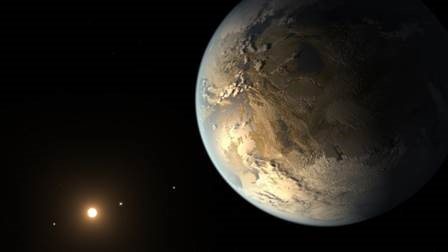Planetary Plating: Cooking up Extra Terrestrial Meals

Artist's concept depicts Kepler-186f, the first validated Earth-size planet to orbit a distant star in the habitable zone. (Credit: NASA)
This weekend, we’re teaming up with NASA to figure out what Extra Terrestrials (if they’re out there!) might be eating on planets outside of our Solar System.
The White House kitchen will be at the USA Science and Engineering Festival this Saturday and Sunday, April 26 and 27, at the Washington Convention Center. The largest science event in the country, the expo attracts over 250,000 people hoping to get a glimpse into the future of science, technology, engineering, and math, or STEM.
This year, the White House chefs are bringing culinary arts to this STEM festival, as we explore the intersection of planetary science and cooking. We are pairing up with Steve Howell, a scientist at the Ames Research Center, who works on the Kepler Telescope, a space observatory launched by NASA to discover Earth-like planets orbiting other stars. The spacecraft, named after the Renaissance astronomer Johannes Kepler, searches for exo-planets, or planets outside of our Solar System, specifically seeking out Earth-sized planets that might be able to sustain life.
Since exo-planet scientists can predict a lot about the conditions for life on these planets, we are imagining what these conditions tell us about plant life that could exist there, teaching us about how things like presence of water or methane, the density, gravity, and atmospheric pressure affect plants. We can use that information to inspire our alien menus and invigorate our foods.
At the USA Science and Engineering Festival, we will demonstrate recipes that reflect the science behind the study of exoplanets, such as the effect of gases such as carbon dioxide on baking (e.g. CO2 is what makes the holes in bread). We’ll be showing how ionic bonds enable complex emulsions to form in some recipes such as mayonnaise or chocolate ganache, and how cross-linking polymers help build the spheres that are essential to cooking.
So if you are in Washington this weekend, be sure to stop by the NASA booth at the USA Science and Engineering Festival to learn more about how the science of exo-planets helps the food we eat here on Earth taste out of this world.
Bill Yosses is the White House pastry chef.
Phil Larson is Senior Advisor for Space and Innovation at the White House Office of Science and Technology Policy.
White House Blogs
- The White House Blog
- Middle Class Task Force
- Council of Economic Advisers
- Council on Environmental Quality
- Council on Women and Girls
- Office of Intergovernmental Affairs
- Office of Management and Budget
- Office of Public Engagement
- Office of Science & Tech Policy
- Office of Urban Affairs
- Open Government
- Faith and Neighborhood Partnerships
- Social Innovation and Civic Participation
- US Trade Representative
- Office National Drug Control Policy
categories
- AIDS Policy
- Alaska
- Blueprint for an America Built to Last
- Budget
- Civil Rights
- Defense
- Disabilities
- Economy
- Education
- Energy and Environment
- Equal Pay
- Ethics
- Faith Based
- Fiscal Responsibility
- Foreign Policy
- Grab Bag
- Health Care
- Homeland Security
- Immigration
- Innovation Fellows
- Inside the White House
- Middle Class Security
- Open Government
- Poverty
- Rural
- Seniors and Social Security
- Service
- Social Innovation
- State of the Union
- Taxes
- Technology
- Urban Policy
- Veterans
- Violence Prevention
- White House Internships
- Women
- Working Families
- Additional Issues

